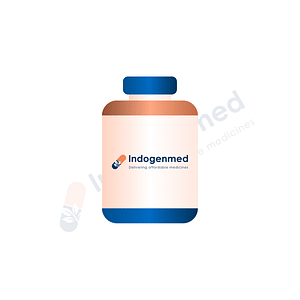
| Packaging Type | Strip |
| Molecule | Osimertinib |
| Generic Name | Osimertinib 80mg |
| Manufactured By | |
| Quantity | 30 Tablets |
| Form | Tablet |
| Country of Origin | Bangladesh |
| Categories | Oncology |
Introduction
Osimatab 80 mg Tablet is manufactured by Eskayef Pharmaceuticals Ltd. It contains osimertinib, a third-generation epidermal growth factor receptor (EGFR) tyrosine kinase inhibitor used for certain types of non-small cell lung cancer (NSCLC) with EGFR mutations. Osimertinib targets abnormal EGFR signaling that drives cancer growth and spread. It is used as a first-line option for metastatic EGFR-mutated NSCLC, as adjuvant therapy after surgery for resected EGFR-mutated NSCLC, and in other specific settings described below. Always use under the supervision of a qualified oncology professional.
Uses of Osimatab 80 mg
Osimertinib is indicated for adults whose tumors have specific EGFR mutations, most commonly exon 19 deletions or exon 21 L858R. It is approved for:
-
Adjuvant therapy after complete tumor resection in EGFR-mutated NSCLC
-
First-line treatment of locally advanced or metastatic EGFR-mutated NSCLC
-
First-line treatment in combination with pemetrexed plus platinum chemotherapy in eligible patients
-
Treatment of metastatic NSCLC with the EGFR T790M resistance mutation after progression on an earlier EGFR TKI
Your care team will confirm mutation status using an approved test before starting therapy.
How it works
Osimertinib binds irreversibly to mutant forms of the EGFR tyrosine kinase, including T790M, blocking downstream signaling that promotes tumor cell proliferation and survival. By inhibiting this pathway, it can slow disease progression and reduce risk of recurrence after surgery in eligible patients.
First-line metastatic EGFR-mutated NSCLC: In the FLAURA trial, first-line osimertinib improved overall survival compared with first-generation EGFR TKIs.
-
Adjuvant setting after surgery: In the ADAURA trial, adjuvant osimertinib significantly improved disease-free survival and overall survival versus placebo in resected EGFR-mutated NSCLC.
-
Combination therapy: Osimertinib plus platinum-pemetrexed prolonged progression-free survival versus osimertinib alone in first-line treatment. Your oncologist will decide whether monotherapy or combination therapy is appropriate.
Dosage
The usual dose is 80 mg by mouth once daily, with or without food, taken at about the same time each day. Continue until disease progression or unacceptable toxicity, or for the full adjuvant course as directed by your oncologist. If you miss a dose and the next dose is due in fewer than 12 hours, skip the missed dose. Do not take two doses at once. Follow your care team’s dose-reduction plan if side effects occur.
Monitoring during treatment
Your team may check:
-
ECGs and electrolytes if you have risk factors for QT prolongation
-
Cardiac function for signs of cardiomyopathy
-
Pulmonary symptoms for interstitial lung disease/pneumonitis
-
Eye symptoms for keratitis
-
Blood counts and routine labs
Report new or worsening cough, shortness of breath, chest pain, palpitations, visual changes, or severe diarrhea promptly.
Common side effects
-
Diarrhea, rash, dry skin or itching, nail changes
-
Decreased appetite, mouth sores
-
Fatigue, cough
These are often mild to moderate and manageable with supportive care or dose adjustments.
Serious risks you should know
-
Interstitial lung disease/pneumonitis: can be severe or fatal; stop and evaluate if new respiratory symptoms occur
-
QTc prolongation and ventricular arrhythmias: risk is higher with electrolyte abnormalities, other QT-prolonging drugs, or congenital long QT
-
Cardiomyopathy and heart failure: monitor for symptoms and consider echocardiography when indicated
-
Keratitis and other eye disorders: urgent assessment if eye pain, vision changes, or redness occur
-
Embryo-fetal toxicity: effective contraception is needed during treatment and for a period after the last dose
Your oncologist will weigh benefits and risks based on your clinical status.
Drug and food interactions
-
Strong CYP3A inhibitors or inducers can alter osimertinib levels; dose adjustments or alternatives may be required
-
Use caution with other QT-prolonging medicines
-
Discuss herbal products and over-the-counter drugs with your care team; avoid starting anything new without approval
Detailed interaction guidance is in the prescribing information.
Special situations
-
Pregnancy and breastfeeding: Not recommended due to potential harm to the fetus or infant; discuss family-planning needs before starting
-
Heart or lung disease: Extra monitoring may be needed
-
Brain metastases: Osimertinib has documented activity in the central nervous system; your oncologist will advise based on imaging and symptoms
Practical tips for patients and caregivers
-
Take the tablet whole; if you cannot swallow tablets, follow your clinic’s instructions for dispersing in non-carbonated water
-
Keep a side-effect diary and bring it to appointments
-
Do not stop or change the dose on your own
-
Keep all lab and imaging appointments to track response and safety
These steps help your team personalize dosing and supportive care.
Storage
Store at room temperature, away from moisture and heat, and out of reach of children. Follow any additional storage information on the pack.
Always ask your healthcare provider before taking any medicine.
Sources
-
FDA Full Prescribing Information for osimertinib tablets, including indications, dosing, contraindications, and safety warnings. FDA Access Data+1
-
MedlinePlus patient information on osimertinib uses and side effects. Mayo Clinic
-
EMA product information and assessment report for Tagrisso (osimertinib). European Medicines Agency (EMA)+2European Commission+2
-
FLAURA first-line trial and overall survival update; ADAURA adjuvant trial and overall survival update. New England Journal of Medicine+2New England Journal of Medicine+2
-
Osimertinib plus chemotherapy first-line trial. New England Journal of Medicine